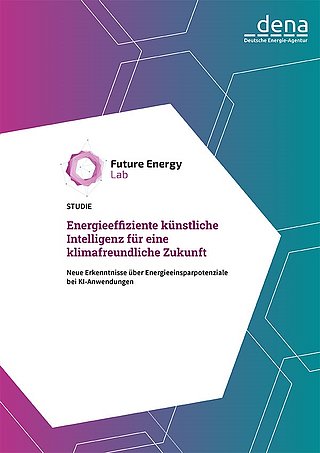Pilot project by dena achieves huge increase in energy efficiency for common AI applications
dena’s Future Energy Lab was able to identify energy savings of between 31 and 65 per cent in the Energy-efficient AI pilot project.
Berlin, Germany, 4 April 2024. The spread of artificial intelligence (AI) is rapid, and it will be used in almost all areas of life and business in the future. At the same time, AI is becoming a further driver of electricity and resource consumption. For example, the use of AI for standard search engines alone could require up to 29.2 TWh of electricity, which is equivalent to the annual electricity consumption of Ireland according to a scientific study by experts at the University of Amsterdam. The big challenge is to utilise the potential of AI while keeping the ecological footprint within acceptable limits.
In collaboration with the Fraunhofer HHI (Institute for Telecommunications, Heinrich Hertz Institute), dena’s Future Energy Lab analysed two approaches to increasing the energy efficiency of common AI applications: on the one hand, when training an AI system using federated learning techniques and, on the other, when executing an AI using a new type of interconnection of special computer chips for use in data centres.
Federated learning is an AI training method in which the AI model is not trained on a central server, but on various end devices. In terms of data protection, this has the advantage that the data from the training process remains with the respective owners. A small AI model is trained on each end device and then sent from the end device to a central server. The models are compiled into one large model. Electricity is required in order to send the models to the central server. In the project, energy efficiency of various model compression methods that reduce the volume of data to be sent were analysed. A compression method that can reduce the power consumption of the training process by 65 per cent was identified.
There are various computer chips that are particularly suitable for running an AI system. Field-programmable gateway arrays (FPGA) are particularly suitable for running AI applications that process images. The project has succeeded in using a new hardware architecture to interconnect the chips in such a way that less computing power is required to control and coordinate the chips. In the process, it was possible to reduce the power consumption for the AI applications in the study by 31 per cent.
The results are summarised in the study entitled Energy-efficient artificial intelligence for a climate-friendly future and anyone interested, including AI developers and data centre operators, can view and apply them.
The project, which was sponsored by the Federal Ministry for Economic Affairs and Climate Action, determined it was possible to achieve major efficiency gains with little effort. This is an example of the great potential for increasing energy efficiency for AI applications. For this reason, one key conclusion is to provide targeted incentives to identify and utilise energy efficiency potential. This applies to companies and AI developers, but also to academic research institutions, as in this case. By targeting funding to study the energy efficiency potential, we can make an important difference in terms of the climate compatibility of AI and other future technologies. The study shows that there are differences in the climate-friendliness of training and the execution of AI applications. In this manner, AI developments that have been developed according to certain standards can be specifically requested. In the future, the results will also be suitable as a foundation for the development of energy efficiency standards for AI applications, similar to the energy efficiency standards for electrical appliances.
About the Future Energy Lab
With the Future Energy Lab, dena has created a space in which the digital and energy industries convene on behalf of the German Federal Ministry for Economic Affairs and Climate Action. The goal is to test new technologies and regulatory approaches for the electricity, heating and mobility sectors in a think tank and pilot testing laboratory capacity in order to drive the the energy transition forward. The Future Energy Lab serves as a platform for bundling the cooperative efforts of all major industry players and creates a creative space for startups to develop innovative solutions. Please visit https://future-energy-lab.de for further information.
-
 Volker Kamm
Volker KammTeam Leader, Communications T: +49 30 66 777-622 volker.kamm(at)dena.de
